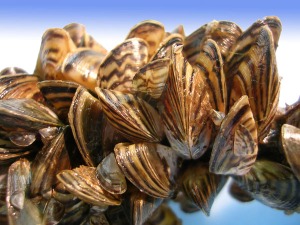
Do you know what is happening to our water bodies? Oftentimes unintentionally, boaters are starting to contaminate our waters with animals and plants that belong to foreign waters. As a boat travels, many small species stick to the bottom of the boat and to other boating equipment, bringing them to local waters. This is causing damage.
AIS, or aquatic invasive species, are plants or animals that do not belong in one lake and are brought to another lake by a boat and other boating equipment. AIS can spread rapidly. The Yahara Chain of Lakes is a popular cluster of lakes in the Madison area. They also serve as super-spreaders of AIS. AIS found in the Yahara Chain of Lakes include Zebra Mussels, Eurasian Watermilfoil, Spiny Water Fleas, and Curly Leaf Pond Weed.
AIS poses a threat to the health of our waters and fisheries. Once they are in a waterbody, they are difficult to control and often have no natural predators. For example, Spiny Water Fleas prey, a tiny crustacean from Asia and Europe has accidentally spread throughout our Great Lakes, preying on native daphnia. Daphnia is a zooplankton that consumes algae. With more Spiny Water Fleas, and therefore less Daphnia, there are fewer grazers to keep algae blooms in check. Having more algae is a major problem throughout Wisconsin.
There are many ways to prevent AIS from spreading to other waterbodies. First, inspect your boats, trailers, and other equipment for any attached aquatic plants or animals. Second, drain all the water from boats, motors, live wells, and any other equipment used for fishing. It is important to never move a live fish from its waterbody. Dispose of any unwanted bait in the trash. Finally, buy small fish, such as minnows, from a Wisconsin bait dealer. If prevention steps are not followed, then the Dane County Staff and AIS partners will be forced to spend money and participate in “Clean Boats, Clean Waters Landing Blitz” an annual event sponsored by the Wisconsin Department of natural resources (DNR) taking place every 4th of July weekend. During this event, DNR volunteers are stationed by boat landings to educate boaters on how to prevent the spread of AIS.
As you can see, AIS are really bad and dangerous for our waterbodies. We all need to work hard in order to prevent AIS from coming into our lakes and rivers. If our waters get infected with AIS, they could cause long term damage.
[Sources:
Madison.com; Chicago Tribune; Dane County Department of Land & Water Resources
]

